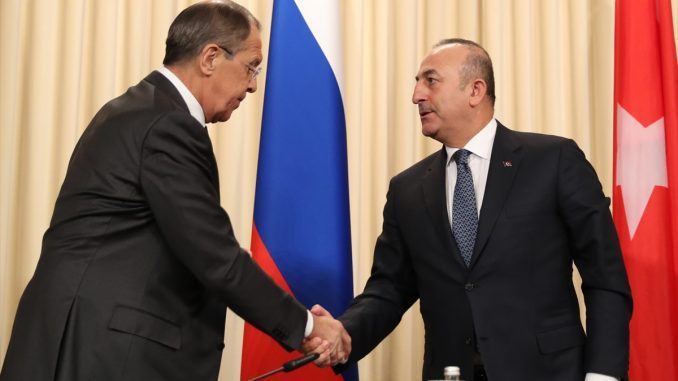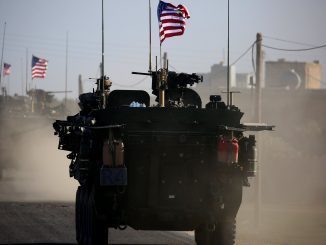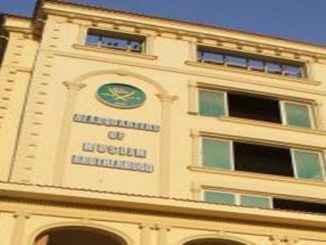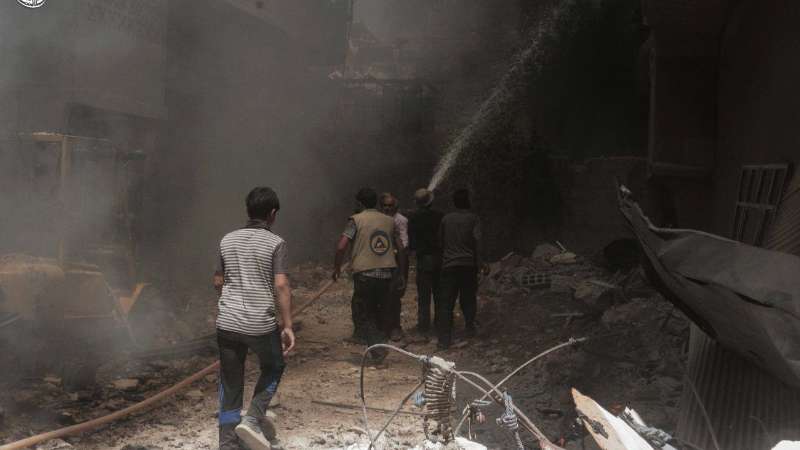
After Russia and Turkey have agreed to guarantee Syria peace talks and support widening a ceasefire across the whole country, the essential question that remains is: Will both political and armed opposition take part in it? and Will it be a step towards ending the Syrian crisis?
Many ceasefire agreements accompanied by peace talks meetings were organized to help find a solution to the crisis, but Assad regime and Iranian forces breached every ceasefire and hindered every peace talks meeting without any pressure moves or real steps from the western powers.
The recent months especially witnessed numerous meetings between the US and Russian foreign ministers to find a solution to the Syria crisis, end the violence and start new peace talks but they led to nothing.
in the end, Russia said it has a new plan for Syria peace talks which can be achieved with powers that have a real effect on the Syrian ground.
Russia and Iran both back Assad, but Turkey, a NATO member, has long made clear it would prefer him to step down. Ankara has however sought to fix its relation with Russia in recent months after the coup attempt as the west abandoned its relations with Turkey.
The three countries said they were ready to help broker a Syria peace deal after the three countries held talks in Moscow on Tuesday and adopted a new declaration.
This new relation included Turkey’s moderation of its rhetoric on Assad, changing the goal of its military operation in Syria, decreasing its support for the armed Syrian opposition, and playing a major role in bringing the Syrian opposition to one table with Assad through the newly made agreement as the new agreement shows.
Moscow has said they would take place in Kazakhstan.
“During the recent meeting in Moscow with my colleagues from Iran and Turkey, we approved a joint declaration in which we confirmed our readiness to guarantee a future agreement between the Syrian government and the opposition,” Sergei Lavrov, the Russian foreign minister, told the Interfax news agency in an interview.
“Negotiations about that are going on,” he said. Interfax said he was referring to talks between the opposition and the Syrian government.
Lavrov said Tuesday that he had succeeded in taking a step in that direction by organizing preliminary talks between the rebels and the regime.
But he did not say which rebel groups were taking part and his announcement was immediately met with confusion
Political Opposition
The High Negotiations Committee (HNC), an opposition umbrella group which represented the rebels at failed peace talks in Geneva this year, said it had no knowledge of the talks.
“We in the High Negotiations Committee certainly have no connection to this matter,” George Sabra, a member of the HNC, told Reuters.
The HNC wasn’t also invited to the talks, but its members said they support the ceasefire and call on the armed groups to take part in it.
The HNC’s general coordinator Riad Hijab in a statement urged rebel groups to cooperate with “sincere regional efforts” to reach a ceasefire but said it had not been invited to any conference.
Russian officials say preparations for the talks are under way, but that invitation to participants have not been sent out and the exact timing has yet to be decided.
The officials, who have spoken of mid-January as a possible date, said it is too early to talk about contacts with the HNC.
Hijab said confidence-building measures were needed to create an atmosphere for political transition talks which should be held in Geneva and sponsored by the United Nations.
“We support the shifts in positions of some international powers and the positive, sincere efforts that could represent a starting point for realizing the Syrian people’s aspirations,” Hijab said in a written statement distributed to the media.
Hijab said the HNC had not been informed of any official arrangements but said: “Certainly, defining a clear agenda will help define the positions of the active powers.”
The HNC said it wants to see a truce that covers all of Syria, in line with previous U.N. resolutions which forbid the use of banned weapons such as barrel bombs and chemical agents. The resolutions call for all sieges to be lifted, humanitarian aid access and a halt in air strikes and forced displacement.
Armed opposition
Lavrov’s latest comments drew so much confusion about the identity of rebel factions that took part in the direct talks with the regime.
One possibility is that Russia spread false news of secret negotiations in order to sow division among the rebels.
Turkey’s foreign ministry did not comment on the Russian claim but pro-Turkey rebel leaders said that in previous negotiations in Ankara they refused a ceasefire offer because it only covered some areas and some factions.
“No matter how great the differences [between rebel factions] we will not allow the enemies to drop out of the cracks of those differences to to drive a wedge between regions and groups,” said one commander from the Jaish al-Mujahideen Islamist group.
Another possibility is that Turkey organized for a narrow group of rebel factions to be involved in the talks.
In fact, a Russian-Turkish meeting will be held with Syrian opposition military commanders on Thursday to discuss a comprehensive ceasefire in Syria, Aljazeera said.
A preliminary meeting was held on Friday and Saturday between the Syrian opposition and Turkish officials. It was followed by another Turkish-sponsored meeting which was attended by Russian military personnel and representatives from most opposition fighting groups. No agreement on a ceasefire was reached.
The sides failed then to reach an agreement because the Russians wanted to exclude eastern Ghouta from the ceasefire and demanded the locations of Fatah al-Sham, the disbanded al-Nusra front from opposition fighters. The opposition rejected the Russian demands.
Tuesday’s meeting was attended by Ahrar al-Sham, Jaish al-Islam, al-Jabha al-Shamiyah, al-Sham Brigade, al-Rahman Brigade, Free Idlib Army, Ajnaad al-Sham, Aleppo Operations Room, the First Coastal Division, and Sultan Murad faction, according to Aljazeera correspondent.
The meeting on Thursday may finally witness an agreement between Russia and the rebels, as the both parts seem keen to find and end to the crisis. Russia may agree to include all Syria in the ceasefire, and the rebels may agree on abiding the ceasefire and take part in direct negotiations with Assad regime, which may be the key to a political solution and the door to ending the six-year crisis.



